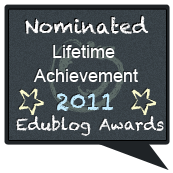I just finished reading a post from my good friend and co-author of The Relevant Educator, Steve Anderson. His recent post, “Why Formative Assessments Matter” got me thinking about assessments in general and how often they are misunderstood and often abused by well-meaning educators.
We have all been taught that there are two categories of assessment, Formative and Summative. Formative assessment is done during a particular lesson to gauge student learning and understanding as the lesson progresses. This often takes the form of quizzes, but there are less formal forms that are as effective. The summative assessment is usually, but not always an exam of some type. It is to determine how much the student learned and understood from the overall experience. This could be a unit exam with various types of questions, or possibly some type of report done by the student.
With my education students I would explain assessments with a cooking metaphor. As a chef prepares a meal he or she would taste it along the preparation process. Based on those tastings adjustments are made. Spices may be added. Cooking time may be lengthened. Some components of the meal may even be eliminated. All of this is formative assessment. This assessment is for the chef to read the results of his or her preparation in order to adjust for the best outcome.
The summative assessment has nothing to do with the preparation, and everything to do with the final outcome. The summative assessment happens when the diner experiences the dish by eating it. How successful was the preparation in the final outcome?
Now, how can such a simple concept get corrupted? Grades! We are all held accountable by some measure. We have determined that grades are what we will use to hold students accountable. We will measure their every effort to learn and assess it with a grade. I guess if the chef assigned a grade to the dish with every tasting and averaged the grades it would not be an outstanding average. But then again how can the dish be measured when it has not yet been completed in the preparation process. Similarly we hold students responsible for quiz grades on assessments, which were originally intended for the teacher to consider in order to make adjustments to a lesson. If the kids do not get it, is it their fault or could it be a shortcoming in the lesson? Yes, students do have a responsibility to bring something to the table as well, but the bulk of the responsibility lies with the teacher.
Grading formative assessments to measure students understanding makes little sense. They all learn in different ways and arrive at learning specific things at different times. To use formative assessment to grade a student is a misuse of the assessment. It is expected that some will get it others won’t, but that is for the teacher to understand and adjust accordingly. That is the purpose of formative assessment.
Of course grading the summative assessment might have some value, as long as the summative assessment is assessing the learning. Too many unit tests however are nitpicking questions for content recall. I guess that lends itself well to Scranton testing. We all know how quickly we can bang out those Scranton test results. It is as easy as ABCD. Essays take too long to grade.
Of course not every teacher does this, but how many is too many? We need to better understand why we do things as educators. Often times the only reason for doing something is because that’s how others do it, or that’s the way it’s always been done.
If we better understand how to utilize assessments, maybe we can better our delivery of lessons without penalizing kids for things that they have little control over. Formative assessment comes in many forms and none really require grades. Summative assessments come in many forms as well. We need to choose those forms that show what individual kids have learned overall. To aim for the low hanging fruit of content questions is missing the mark. They have their place, but they should not be the focus of any test.
This should be a topic of faculty or department meetings. These are the things that need to be addressed by educators more than the usual fare of such meetings. We need to better understand what we do, and why we do it as educators. We need to be more reflective and critical within our own profession.












Do you think most educators know how to administer/give assessments?
harrisfr
I am not qualified to answer that, but many teachers I have encountered could use a refresher course on assessments. It is something that needs to be readdressed from time to time.
What is a worry is that it seems the more we assess, the more dismal the results become. (:
We practice far too much assessment of learning (summative) and too little assessment for learning (formative).
Well done, Tom. The grading system used by most school districts certainly doesn’t align to what we know about effective assessment or best instructional practices. It also confuses parents and moves the central question from “What has my child learned?” to “What is my child’s grade”?
[…] Now, how can such a simple concept get corrupted? Grades! We are all held accountable by some measure. We have determined that grades are what we will use to hold students accountable. We will measure their every Read the full article […]
Right on the money again Tom! We devalue the learning experience by putting a grade to an endeavor that should, if we are putting the students at the center of the learning, be personally meaningful and enlightening. Thank you for shining a light on a practice that is long overdue for an overhaul.
What about higher education where students have to take licensing exams following a program? How do I know students are ready for it if I don’t do assessments throughout the semester? How do I prepare them for it without practice? I’m just curious because I’ve been looking for alternatives for quite some time now. Also, I think formative assessments give students and teachers feedback. I use it as a way to monitor vital signs. If I notice a disturbing trend in grades, I immediately intervene and ask what’s going on with the students….if I didn’t, I feel I would be setting students up for failure when it comes time to take their licensing exam…not to mention that my job is tied to those results. What is the best way to evaluate students while also giving them the practice they need to pass a multiple choice exam as the capstone of their training?
Teachermedic
I never said do NOT assess. I only question grading and counting those grades in a student’s average. Teachers do need feedback to adjust. It stands to reason that if students are being taught something for the first time, some of the feedback will be negative, because they are learning it for the first time. That, however, should not be held against them. The teacher does need that information to adjust the lessons, but the grades should be for the teacher’s use not the student’s average. As for the goal in preparing students for a standardized test and your job being dependent on their results, well that’s another blog post for another bottle of wine.
Reblogged this on Adventures in Education and commented:
A better understanding of assessment…
[…] Formative assessment is done during a particular lesson to gauge student learning and understanding as the lesson progresses. This often takes the form of quizzes, but there are less formal forms that are as effective. […]
[…] I just finished reading a post from my good friend and co-author of The Relevant Educator, Steve Anderson. […]
Assessment in general could use a deep reinvention with a greater emphasis on a holistic view of the student and on high level reasoning. Perhaps borrowing a page from the software space where we see the need for frequent or continuous testing, but to make that reasonable we insist that the tests be lightweight and not destructively interfere with the development process.
Perhaps smaller, lighter, assessments in multiple forms, which can be analysed statistically and where the student eventually displays mastery of the content.
I use Socrative and Poll Everywhere…a non-invasive way to check the pulse of the students’ understanding. I use quizzes to help define their study habits and process by assigning online quizzes after each chapter…they’re not timed and can be performed (AND SHOULD BE) with the book open so it’s sort of the “capstone” of their training in that particular content area. So far, I’ve had good results and yes, these do count as a grade because if there is no risk to losing then a student will shrug off doing them in the first place. I think the key is to using the quiz to FORM and stabilize their study process so that when it comes time to take the test, they will not only do so confidently but successfully.
[…] The Corruption of Assessments | My Island View […]
[…] I just finished reading a post from my good friend and co-author of The Relevant Educator, Steve Anderson. His recent post, “Why Formative Assessments Matter” got me thinking about assessments in g… […]
[…] and concerns swirling through my head, I couldn’t find answers to them all! After reading this article today, I don’t feel so bad about the take-home quizzes, but I was still […]
As much as I agree with the problem of assigning numbers as a rating of performance in formative assessment, (struggling with something new is not a reflection of effort or achievement) I think the concrete feedback for students is important. I have witnessed many students over-evaluate their competencies in the process of learning and “have taken their foot off the gas”. Formative assessment is as much for the teacher as for the students in adjusting their effort and approach to the subject. There are many ways to weight the numbers at the end of the course to mitigate the “unfair” results in formative assessment.